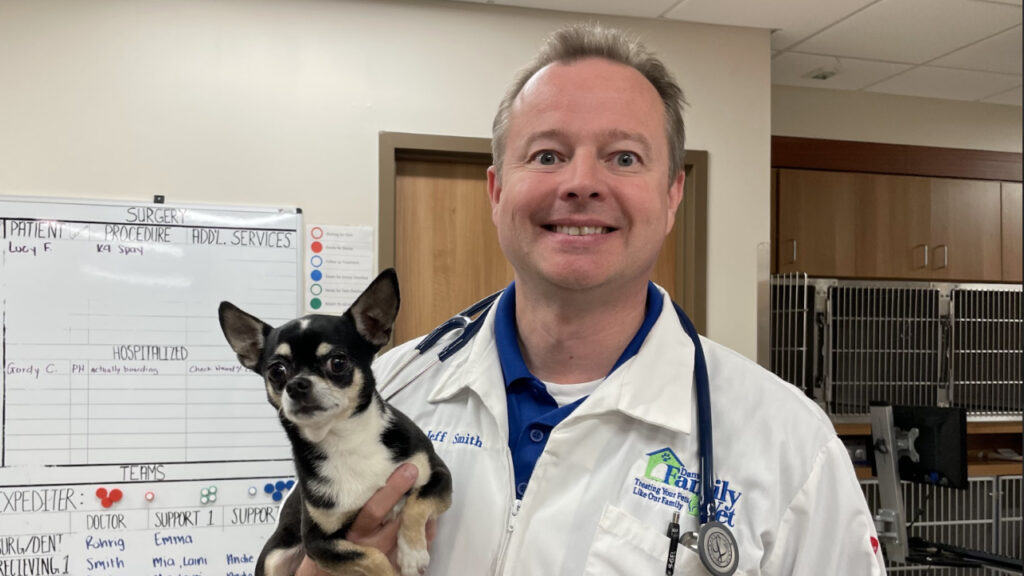This article was originally published in Danville Register & Bee.
It was a busy afternoon at Danville Family Vet when a young couple came in, carrying a small and scared puppy. Tears streamed down their faces as they explained that their beloved pet had swallowed a screw while playing in the backyard. It was clear that the pup required immediate attention, and my heart went out to the pet parents as they anxiously awaited my assessment.
Upon examination, I could see that the puppy was in pain, whimpering softly and trying to vomit. These are common symptoms of foreign body ingestion, and I quickly recommended an x-ray to confirm my suspicions. The results showed that the screw was lodged in the puppy’s small intestine, causing a blockage.
Surgery was the only option to remove the screw, and I immediately jumped to discussing the treatment plan, and explaining the purpose and cost of each procedure. The couple looked at each other in despair, their eyes red from crying. They had already spent all their savings on the puppy, and they were unable to afford the recommended treatment. As we were going through other options and payment plans, I was dreading the moment when I would have to mention euthanasia as the last resort.
As a veterinarian, I take an oath to protect and care for animals, and it hurts me deeply when I can’t do what’s right for the pet due to external limitations. In situations like this, I feel helpless, frustrated, and heartbroken. What is unarguably a traumatic experience for pet owners, who increasingly consider their companions as family members, it is no less emotionally taxing for the veterinary teams who need to navigate the financial realities of pet ownership. This is the dark side of our profession, which can lead to depression, burnout, and compassion fatigue. Veterinarians are four times more likely to die by suicide than the general population.

Being financially prepared as a pet owner and taking a proactive approach to your pet’s health is crucial for ensuring the well-being and longevity of our furry friends. Planning ahead can help avoid unwelcome surprises and cope with them if they arise. Here are some tips on how to be prepared.
Budget for routine care: It’s important to budget for routine veterinary care, such as annual checkups, vaccinations, and preventive medications. Regular dental cleaning for pets is crucial, as overlooking it can lead to serious consequences such as periodontal disease, tooth loss, and even systemic infections which are very costly to treat. Consider enrolling in a wellness plan or a membership program – this will spread the cost of preventive services over time, making it more affordable and easier to manage.
Consider pet insurance: Pet insurance can help pet owners cover unexpected veterinary costs, including emergency care and chronic conditions. One downside of pet insurance is that it requires upfront payment from the pet owner at the time of service, but there are some providers, such as Trupanion, that pay the hospitals directly. You can use online platforms, such as Pawlicy Advisor, to research and compare different insurance companies and understand what they cover.
Save for emergencies: Just like humans, pets can experience unexpected medical emergencies. Have an emergency fund set aside specifically for your pet’s medical expenses. There are also some crowdfunding sites, such as Waggle.org, where pet owners can raise money for the treatment of their companions.
Be proactive about preventive care: Preventing health problems is always more cost-effective than treating them. Make sure your pet is getting enough exercise, a healthy diet, and regular check-ups with a veterinarian. Pay special attention to weight management – obesity is a growing problem, putting pets at increased risk for serious issues such as arthritis, diabetes mellitus, kidney disease, and even cancer, which can be expensive to treat.
Educate yourself on alternative payment options: Some veterinary clinics offer payment plans or financing options for unexpected expenses. Ask your veterinarian about these options and see if they might be a good fit for you. Do your own research on the available financial assistance programs, pet credit cards, and other payment alternatives. Some popular third-party lenders are CareCredit, Scratchpay, The Wells Fargo Health Advantage Card, LendingUSA, and iCare Financial. Find out what non-profit organizations in your area can provide financial aid for pet owners in need.
Learn about specifics of your pet’s health: Similar to humans, pets can be predisposed to certain illnesses based on their genetics, family history, and conformation. Oftentimes, pet owners only discover this when the signs become clinically apparent and the disease has evolved into a chronic condition. Testing for these predispositions is available for pets, so ask your vet about breed-specific screenings, red-flag situations, and general lifestyle advice to mitigate the risks.
The human-animal bond is a powerful connection that can bring immense joy and fulfillment to our lives. By working together, we can ensure that our furry companions get the care they deserve and live long and happy lives.
